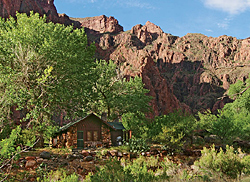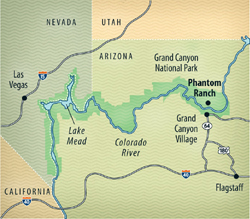sierraclub.org - sierra magazine - july/august 2010 - escape: grand canyon's phantom ranch


Escape | Grand Canyon's Phantom Ranch
By Jessi Phillips
 Fly into Flagstaff, Arizona. Check into the Zane Grey or Jane Russell Room at the historic, ornate Hotel Monte Vista. Commence carbo-loading at Flagstaff Brewing Company. Wake up at 5 a.m. and drive 90 monotonous miles to the canyon's south rim, watching for elk and coyotes along the way. Navigate to the top of the South Kaibab Trail, at Yaki Point. Peer over the edge to the bottom, 4,700 feet below. Try not to panic. Begin 7-mile descent, stopping for water breaks and mind-altering views. Hike three to seven hours, depending on your fitness level and tolerance for pain--the downhill march will punish even a seasoned hiker's knees and ankles. Savor the bird's-eye view of the ranch's stone cabins, the bright green cottonwoods, and the Colorado River's wide rolling waters.
Fly into Flagstaff, Arizona. Check into the Zane Grey or Jane Russell Room at the historic, ornate Hotel Monte Vista. Commence carbo-loading at Flagstaff Brewing Company. Wake up at 5 a.m. and drive 90 monotonous miles to the canyon's south rim, watching for elk and coyotes along the way. Navigate to the top of the South Kaibab Trail, at Yaki Point. Peer over the edge to the bottom, 4,700 feet below. Try not to panic. Begin 7-mile descent, stopping for water breaks and mind-altering views. Hike three to seven hours, depending on your fitness level and tolerance for pain--the downhill march will punish even a seasoned hiker's knees and ankles. Savor the bird's-eye view of the ranch's stone cabins, the bright green cottonwoods, and the Colorado River's wide rolling waters.
Vanquishing the canyon floor's ungodly heat (up to 115 degrees Fahrenheit in summer) by shedding sweaty clothes and plunging into frigid Bright Angel Creek. (Runner-up: Knocking back that first Tecate in the Phantom Ranch canteen.)
The 9.5-mile slog up the Bright Angel Trail, a shadier and more gradual ascent than the South Kaibab, but still horrendous. Crying is allowed, but try laughing instead. (Runner-up: Waking up for a 6 a.m. breakfast with legs of concrete in a dormitory with nine snoring strangers.)
 Sjors, the wiry National Park Service volunteer who's lived at the Phantom Ranch ranger station for 23 years. He knows everything about the canyon's wildlife and geology, and he will probably save you if you do something stupid. Just don't ask for his last name.
Sjors, the wiry National Park Service volunteer who's lived at the Phantom Ranch ranger station for 23 years. He knows everything about the canyon's wildlife and geology, and he will probably save you if you do something stupid. Just don't ask for his last name.
Mary Jane Colter, the architect who designed the ranch's quaint stone bungalows in 1922, still haunts the canteen during the dark canyon night.
Your steak and potato dinner might not be organic or locally sourced, but at least part of its journey is carbon neutral--all supplies are packed in each morning by a string of mules led by intrepid cowboys. The ranch composts nearly 20,000 pounds of kitchen waste each year. Trees are watered with a zero-emission, gravity-fed irrigation system. (And as a former employee, I can attest that the ranch is militant about picking up litter, separating recyclables, and repurposing trash. Bagel bags become ice packs; shredded office paper becomes packing material.)
The sack lunch contains heavily packaged, nonorganic snacks, and the place goes through a lot of lemonade cups and beer cans.
You can volunteer with the National Park Service to weed invasive species, but what really matters is what you don't do. Don't leave trash, don't ignore signs for protected nature areas, and don't hike like an idiot--being airlifted out because of near-fatal dehydration is far from ecofriendly.
Photo by Chris Adams; map by Peter and Maria Hoey